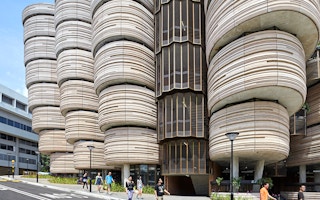Students from Singapore’s second largest higher-education institution, Nanyang Technological University (NTU), have formed a campaign group to pressure the university to pull its investments in fossil fuels companies.
To continue reading, subscribe to Eco‑Business.
There's something for everyone. We offer a range of subscription plans.
- Access our stories and receive our Insights Weekly newsletter with the free EB Member plan.
- Unlock unlimited access to our content and archive with EB Circle.
- Publish your content with EB Premium.
Named NTU Divest, the group has called on the university to disclose the amount it invests in the fossil fuels industry with a view to reinvest the funds in sustainable industries. It is the third university group in three years to sprout a divestment campaign in the conservative city-state following similar moves from students at Yale-NUS in 2017 and the National University of Singapore (NUS) the following year.
“We launched NTU Divest because we want NTU to be accountable for its investments,” the group of five founding members told Eco-Business.
“The fossil fuel industry is not compatible with a climate-safe future. Collective individual action alone is not sufficient; systems and institutions must respond to the climate crisis with the urgency and magnitude that it warrants,” they said.
The founding members are: fourth-year ecology student, Kathleen Ooi; third-year English literature and art history student, Cherrell Ng; class of 2020 ecology graduate, Chua Kai Ting; second-year materials science and engineering student, Tan Shi Zhou; and second-year public policy and global affairs student, Shawn Ang.

The founding members of NTU Divest on a Zoom call. They chose as their backdrop a burning house in tribute to student activist Greta Thunberg, who has said ‘our house is on fire’ in a rallying cry for climate action. Image: NTU Divest
NTU’s management has told the group that environmental, social, and governance (ESG) factors guide its investments, but would not reveal details on its ESG policies or disclose its fossil fuels exposure, citing the complexity of investment holdings and a lack of direct control over investments, NTU Divest said.
NTU’s endowment fund is worth S$1.9 billion, according to a parliamentary reply by Singapore’s Education Minister Ong Ye Kung last September.
A lack of transparency around how much of the university’s endowment is invested in fossil fuels is a key obstacle to divestment efforts, since the endowment is independently managed by external fund managers to prevent a conflict of interest.
NTU Divest has also reached out to the university’s president, Dr Subra Suresh, who they note has been a vocal supporter of sustainability since his appointment in 2018, committing to boost solar energy deployment and increase energy efficiency on campus. Suresh has not responded.
“
The fossil fuel industry is not compatible with a climate-safe future. Collective individual action alone is not sufficient; systems and institutions must respond to the climate crisis with the urgency and magnitude that it warrants.
NTU Divest
The group believes that a portion of the university’s investments go into fossil fuels, “since the school has not communicated otherwise”, and pointed out that rival college NUS has revealed that it has a “single-digit fossil fuel exposure.”
“We hope that NTU would be as transparent and willing to have conversations about divesting from fossil fuels and reinvesting into sustainable industries,” the group said, pointing to other universities, such as partner colleges University of Manchester and the University of California, which have announced divestment plans in the last year.
“As a leading global university committed to environmental sustainability, we believe that NTU is similarly capable of committing to divestment,” they said.
Update 26/6/20: Tan Sin Mui, NTU’s chief investment officer, said in a statement: “NTU adopts an Environmental, Social and Governance—or ESG-aware—investment approach that is more holistic than just focusing on fossil fuels divestment. The University recognises that the cost of capital for ESG-unfriendly investments has been rising, and this is taken into consideration in the investment decision-making process. This investment mandate is given to our external fund managers and their exposure to fossil fuels is small and incidental to their strategy.”
Update 27/6/20: NTU Divest responded to NTU’s statement, saying they wanted to have direct communication with the university, and maintain an open dialogue. They stated:
- NTU has a duty to its stakeholders — especially its students. Our school should be transparent and accountable for its activities, including those in the financial sphere. We have only the best interests of our university, our country, and our world at heart, and we want to collaborate with NTU’s administration in moving towards a just and sustainable future.
- We note that NTU has confirmed its investment in fossil fuels.
- We also note that a “small” fossil fuel exposure of NTU’s $1.9 billion endowment would still be a hefty sum; a 1 per cent exposure would translate to a $19 million invested. Hence, we reiterate the call for NTU to reveal the exact amount of its fossil fuel exposure.
- We understand that ESG considerations factor into NTU’’s investment approach, but without knowing NTU’s exact ESG policies and frameworks, it is difficult to be confident in the school’s assertions of its holistic ESG approach. As such, we hope NTU will share its ESG framework.
- While NTU’s investments in the fossil fuel industry are “incidental”, it is not enough for these investments to be unintentional. Investments are not only financial decisions - they are also moral and ethical positions. They endorse and fund an industry’s activities, signalling that they are acceptable and should continue. Just as NTU would not associate with the tobacco, arms, and vice industries, NTU must terminate its continued association and financial support for the fossil fuel industry.
Empowering activism
As well as engage with the school’s management, NTU Divest aims to become a platform for NTU’s community to talk about climate action and why it’s important for the university to reduce its reliance on fossil fuels. It is also about “empowering individuals to speak up about environmental and social injustices”.
The group is the latest sign of Singapore’s increasingly vocal green movement. The city-state does not tolerate protests without a permit, and marches or sit-ins are not allowed. However last year, a month after Prime Minister Lee Hsien Loong spoke about climate threats for the first time in his National Day Rally speech, more than 2,000 people attended the country’s first climate rally to protest against government inaction on climate change.
Earlier this month, a taskforce of industry leaders assembled by the government to revitalise the Singapore post-Covid economy was criticised in parliament and by civic society groups for excluding voices they say could set the country on a more sustainable path. NTU Divest was among those pushing for the inclusion of minority groups and green businesses to be represented in the taskforce.










